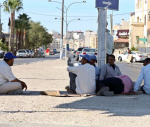It still is difficult to take any of the components of the American plan for settling the Palestinian-Israeli conflict for granted.
There have been a lot of indicative leaks that could not be but authentic. There has also been much scepticism on both sides, with both Palestinians and Israelis expressing deep dissatisfaction with the circulating ideas presented to them.
Palestinian Authority President Mahmoud Abbas made it clear that he would not compromise on the right of return of the Palestinian refugees, he would never recognise Israel as a Jewish state, and he would not accept anything less than East Jerusalem as we knew it before 1967 as the capital of the Palestinian state.
“Not Abu Dis,” he loudly said.
This tough talk of the Palestinian leader was backed by the Arab League follow-up committee that met with US Secretary of State John Kerry in Paris last Sunday, according to a statement by Riad Al Malki, the Palestinian foreign minister who is a member of the said nine-member ministerial committee.
The position of Israeli leaders, on the other hand, is the usual ultra-extremist on all pending issues, as well as provocative, with construction projects on occupied Palestinian land announced successively to drive the message through that Israel is bent on destroying Kerry’s peace mission.
Although Abbas’ pronunciations tend to dash the hopes of those who often count on additional concessions from the Palestinian side to narrow the gap that Israeli intransigence keeps expanding, the expectation that a secret deal is already on the table, awaiting maturity, is constantly feeding Jordanian fears that the terms of the said deal could jeopardise the Kingdom.
That looks unlikely in view of the Israeli handling of Kerry’s scheme.
Israel continues to do the exact opposite of what would create a better climate for productive discussions, totally mindless of Washington’s efforts.
The latest Israeli announcement of a new plan to build 1,400 settler housing units on Palestinian land has prompted strong reaction from EU policy chief Catherine Ashton, who demanded that Israel stop construction immediately.
Ashton described the settlements as illegal under international law and an obstacle to peace that would render the two-state solution impossible.
The new construction project announcement was postponed for a few days, until Kerry completed his last visit to the region and left.
Under the prevailing conditions, there is good reason to believe that it is highly unlikely that there would be any deal, and therefore no worries should be justified — for the time being.
Paradoxically, however, the Israeli intransigence seems to be the “desired” safety valve against a bad deal.
What is needed is not just that; not just a temporary escape from what continues to be clandestinely woven in dense darkness for the region at the very expense of the rights of its peoples.
The whole approach to peacemaking should be radically revised by returning the entire file of the Arab-Israeli conflict to where it belongs: the United Nations.
The solid guarantee to block incorrect and biased shady deals is the application of international law, not the continued coercion of the weaker side in favour of the unduly immune aggressor and occupier.
The undisputed reality, secret or not, is that Kerry’s ideas are indeed worrying, and should be worrying, not only to the Jordanians but to the Palestinians as well. They should also be worrying to all those who claim to be sincerely pursuing peace and stability in this turbulent region by resolving the historical Arab-Israeli conflict.
If Kerry’s ideas were to see the light, they would further radicalise and destabilise the entire region, as they would be rewarding Israeli aggression and compounding flagrant injustice inflicted upon the Palestinians, and indeed others, for the last six decades.
The Kerry proposals, if what is circulating about them is accurate, do compromise, to put very mildly, the basic terms of legality, international law, fairness and justice.
Apparently the starting point of Kerry’s proposals is the Israeli position on all so-called final status issues. His endeavour is to redesign Israeli demands in a manner that could make them palatable to the Arab side.
According to press reports, Kerry sought the amendment of the 2002 Arab Peace Initiative to include language recognising Israel as a state for the Jewish people.
I need not elaborate on the disastrous implications of such an idea, implications that far exceed the abolition of the right of return of the Palestinian refugees, one of the many Jordanian-related concerns.
This fear was further aggravated by other reports indicating that Kerry tried to push forth the formula that the right of return should not apply to Palestinians who acquired nationality of a third country.
Other reports spoke of a lip service reference to Jerusalem meant to placate the Palestinians.
Kerry did not challenge Israeli rejection of any reference to Jerusalem as the shared capital of both Israelis and Palestinians, on the grounds that the Palestinians are entitled to East Jerusalem, as stipulated in the renowned two-state formula, in the many Security Council resolutions and the Quartet roadmap.
Instead, he offered to reduce the wording to simply say that the Palestinians aspire to have Jerusalem as their capital. Nothing could be more non-committal and empty.
This is another major concern for the Jordanians.
Jordanian officials repeatedly assert that while they would never want to act on behalf of the Palestinians or directly involve themselves in the negotiations, they would not accept any political deal that jeopardises their national interests.
Naturally, when it comes to the so-called final status issues, the Israeli illegal settlements, Jerusalem, borders, security and refugees, it is hard to distinguish between what is a Jordanian interest and what is a Palestinian interest.
The simple fact is that what is good for one is good for the other and what is bad for the Palestinians would unquestionably be harmful to the Jordanian national interests as well.
But that only applies once we focus on the Jordanian-Palestinian narrow circle at the very heart of the historic dispute.
The wider circle involves the entire region and often affects events worldwide.
It is becoming increasingly harder not to link the many recent world crises and wars to the perpetual Israeli aggression and the failure of the so-called international community to resolve it rightly and justly.
This region will not enjoy stability, progress and safety while this conflict lasts.













